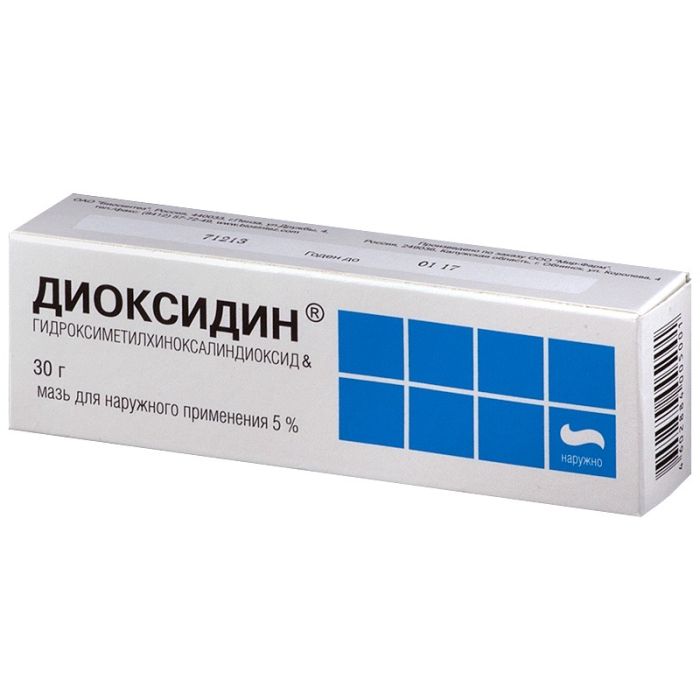Hydroksymetylhynoksylyndyoksyd | Dioxidin ointment 5%, 30 g
Special Price
$36
Regular Price
$44
In stock
SKU
BID494554
Release form
Ointment for external use.
Ointment for external use.
Release form
Ointment for external use.
30 tr3021 zrrdds10 trd 3041 Packaging
Tube 30 g.
Pharmacological action
Dioxidine is a broad-spectrum antibacterial bactericidal drug.
Active against: Proteus vulgaris, Pseudomonas aeruginosa, Friedlander bacillus, Escherichia coli, Shigella dysenteria, Shigella flexneri, Shigella boydii, Shigella sonnei, Salmonella spp, Staphylococcus spp, Streptococcus spprobenifenta curfens.
Acts on strains of bacteria resistant to other antibacterial agents, including antibiotics. It has no local irritating effect. Perhaps the development of drug resistance of bacteria.
The treatment of burns and purulent-necrotic wounds promotes faster cleaning of the wound surface, stimulates reparative regeneration and marginal epithelization, and favorably affects the course of the wound process.
Indications
Wound and burn infection:
- Superficial and deep purulent wounds of various localization.
- Long-term healing wounds and trophic ulcers.
- Phlegmon soft tissue.
- Infected Burns.
- Purulent wounds with osteomyelitis.
- Purulent processes in the pelvic tissue.
Contraindications
- Hypersensitivity.
- Adrenal insufficiency (including history).
- Pregnancy.
- Lactation.
Use with caution in renal failure.
Use during pregnancy and lactation
If necessary, the appointment of the drug during lactation should decide whether to stop breastfeeding.
In experimental studies, it has been shown that dioxidine has a teratogenic and embryotoxic effect, has mutagenic properties.
Given this, women of childbearing age are prescribed the drug only if other antimicrobials are ineffective.
Special instructions
Antihistamines and calcium preparations are recommended for the prevention of adverse reactions. With the development of adverse reactions, the ointment should be discarded.
In patients with impaired renal function, the drug should be prescribed in lower doses.
Composition of
100 g of ointment contains:
dioxidine - 5 g,
polyethylene oxide-400 - 74.9 g,
polyethylene oxide-1500 - 20 g,
nipagin - 0.08 g,
propyl paraoxybenzoic acid ester - 0.02 g.
Dosage and Administration
Topically.
A thin layer is applied to the affected area once a day.
Course up to 3 weeks.
Side effects
Local reactions, near-dermatitis dermatitis.
Storage conditions
In the dark place at a temperature of no higher than 20 РC.
Deystvuyuschee
substance Hydroxymethylquinoxylindioxide
Terms and conditions
prescription
dosage form
Ointment
Russia, Russia, Russia biosynthesis
Ointment for external use.
30 tr3021 zrrdds10 trd 3041 Packaging
Tube 30 g.
Pharmacological action
Dioxidine is a broad-spectrum antibacterial bactericidal drug.
Active against: Proteus vulgaris, Pseudomonas aeruginosa, Friedlander bacillus, Escherichia coli, Shigella dysenteria, Shigella flexneri, Shigella boydii, Shigella sonnei, Salmonella spp, Staphylococcus spp, Streptococcus spprobenifenta curfens.
Acts on strains of bacteria resistant to other antibacterial agents, including antibiotics. It has no local irritating effect. Perhaps the development of drug resistance of bacteria.
The treatment of burns and purulent-necrotic wounds promotes faster cleaning of the wound surface, stimulates reparative regeneration and marginal epithelization, and favorably affects the course of the wound process.
Indications
Wound and burn infection:
- Superficial and deep purulent wounds of various localization.
- Long-term healing wounds and trophic ulcers.
- Phlegmon soft tissue.
- Infected Burns.
- Purulent wounds with osteomyelitis.
- Purulent processes in the pelvic tissue.
Contraindications
- Hypersensitivity.
- Adrenal insufficiency (including history).
- Pregnancy.
- Lactation.
Use with caution in renal failure.
Use during pregnancy and lactation
If necessary, the appointment of the drug during lactation should decide whether to stop breastfeeding.
In experimental studies, it has been shown that dioxidine has a teratogenic and embryotoxic effect, has mutagenic properties.
Given this, women of childbearing age are prescribed the drug only if other antimicrobials are ineffective.
Special instructions
Antihistamines and calcium preparations are recommended for the prevention of adverse reactions. With the development of adverse reactions, the ointment should be discarded.
In patients with impaired renal function, the drug should be prescribed in lower doses.
Composition of
100 g of ointment contains:
dioxidine - 5 g,
polyethylene oxide-400 - 74.9 g,
polyethylene oxide-1500 - 20 g,
nipagin - 0.08 g,
propyl paraoxybenzoic acid ester - 0.02 g.
Dosage and Administration
Topically.
A thin layer is applied to the affected area once a day.
Course up to 3 weeks.
Side effects
Local reactions, near-dermatitis dermatitis.
Storage conditions
In the dark place at a temperature of no higher than 20 РC.
Deystvuyuschee
substance Hydroxymethylquinoxylindioxide
Terms and conditions
prescription
dosage form
Ointment
Russia, Russia, Russia biosynthesis
Submit your review to Earn 10 Reward Points click here to login
Write Your Own Review

